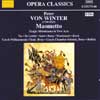Winter Maometto
An excursion into religious fanaticism from a minor sub-Rossini composer
View record and artist detailsRecord and Artist Details
Composer or Director: Peter von Winter
Genre:
Opera
Label: Marco Polo
Magazine Review Date: 13/2004
Media Format: CD or Download
Media Runtime: 137
Mastering:
Stereo
DDD
Catalogue Number: 8 225279/80

Tracks:
| Composition | Artist Credit |
|---|---|
| Maometto |
Peter von Winter, Composer
Antonio de Gobbi, Zopiro, Bass Cesare Ruta, Fanor, Tenor Czech Chamber Soloists Czech Philharmonic Choir Gabriele Bellini, Conductor Gloria Montanari, Seide, Mezzo soprano Luca Salsi, Omar, Baritone Maria Luigi Borsi, Palmira, Soprano Peter von Winter, Composer Sebastian Na, Maometto, Tenor |
Author: Richard Osborne
The Munich-based court composer Peter von Winter was 62 when he wrote his ‘melodramatic tragedy in two acts’ Maometto, first seen at La Scala, Milan in January 1817. Rossini saw the production and was mildly impressed by it, not least by the Act 2 Trio ‘Dei che piangendo imploro’ with its off-stage prayer and on-stage assassins (Seide and Palmira, brother and sister and parricides to boot, as they will shortly discover). Winter’s Mohammed is the man himself, the founder of Islam (the action is set in Mecca c630), and so not to be confused with the 15th-century Turkish sultan whose adventures inspired Rossini to write Maometto II (Naples, 1820) which in its later revision would become a fashionably contemporary piece about the Greek War of Independence, Le Siège de Corinthe (Paris, 1826).
Winter’s source, adapted for him by Felice Romani, is Voltaire’s tragedy Mahomet. Voltaire himself provided an uncompromising précis of the action in a letter to King Frederick II in December 1740. ‘It concerns a young man [Seide] born virtuous, who, seduced by fanaticism, murders an old man [Zopiro] who loves him, a young man, who thinking to know God, unknowingly becomes a parricide; it concerns an impostor [Mahomet] who orders the old man’s murder and who promises the murderer an incest [Palmira] for reward.’ Was the anti-clerical Voltaire’s real target in portraying Mohammed as an unscrupulous religious charlatan not the leader of Islam but the Pope? Possibly, though I doubt whether there are any immediate plans to revive Voltaire’s play in France at the moment.
Winter was not a composer of the front rank but he knew his trade and that of others. The shadow of Mozart’s La clemenza di Tito can be seen behind moments in Maometto. In his ensemble-writing and orchestration, he is more German than Italian; at the same time, he had been well versed in the Italian bel canto style (by Salieri, among others) and knew precisely the directions in which Rossini-led Italian opera seria was heading.
This Marco Polo recording was made live during the venturesome Rossini in Wildbad Festival. A rather sedate account of parts of the first act led me to wonder whether the opera is in any sense combustible but the performance grows in stature and intensity. The Korean tenor Sebastian Na makes an impressively violent and irascible Maometto and the Palmira, Maria Luigia Borsi, rises splendidly to the challenge of the great summarising scena in which she elects to die rather than submit to the whims of the all-conquering prophet.
Winter’s source, adapted for him by Felice Romani, is Voltaire’s tragedy Mahomet. Voltaire himself provided an uncompromising précis of the action in a letter to King Frederick II in December 1740. ‘It concerns a young man [Seide] born virtuous, who, seduced by fanaticism, murders an old man [Zopiro] who loves him, a young man, who thinking to know God, unknowingly becomes a parricide; it concerns an impostor [Mahomet] who orders the old man’s murder and who promises the murderer an incest [Palmira] for reward.’ Was the anti-clerical Voltaire’s real target in portraying Mohammed as an unscrupulous religious charlatan not the leader of Islam but the Pope? Possibly, though I doubt whether there are any immediate plans to revive Voltaire’s play in France at the moment.
Winter was not a composer of the front rank but he knew his trade and that of others. The shadow of Mozart’s La clemenza di Tito can be seen behind moments in Maometto. In his ensemble-writing and orchestration, he is more German than Italian; at the same time, he had been well versed in the Italian bel canto style (by Salieri, among others) and knew precisely the directions in which Rossini-led Italian opera seria was heading.
This Marco Polo recording was made live during the venturesome Rossini in Wildbad Festival. A rather sedate account of parts of the first act led me to wonder whether the opera is in any sense combustible but the performance grows in stature and intensity. The Korean tenor Sebastian Na makes an impressively violent and irascible Maometto and the Palmira, Maria Luigia Borsi, rises splendidly to the challenge of the great summarising scena in which she elects to die rather than submit to the whims of the all-conquering prophet.
Discover the world's largest classical music catalogue with Presto Music.

Gramophone Digital Club
- Digital Edition
- Digital Archive
- Reviews Database
- Full website access
From £8.75 / month
Subscribe
Gramophone Full Club
- Print Edition
- Digital Edition
- Digital Archive
- Reviews Database
- Full website access
From £11.00 / month
Subscribe
If you are a library, university or other organisation that would be interested in an institutional subscription to Gramophone please click here for further information.




